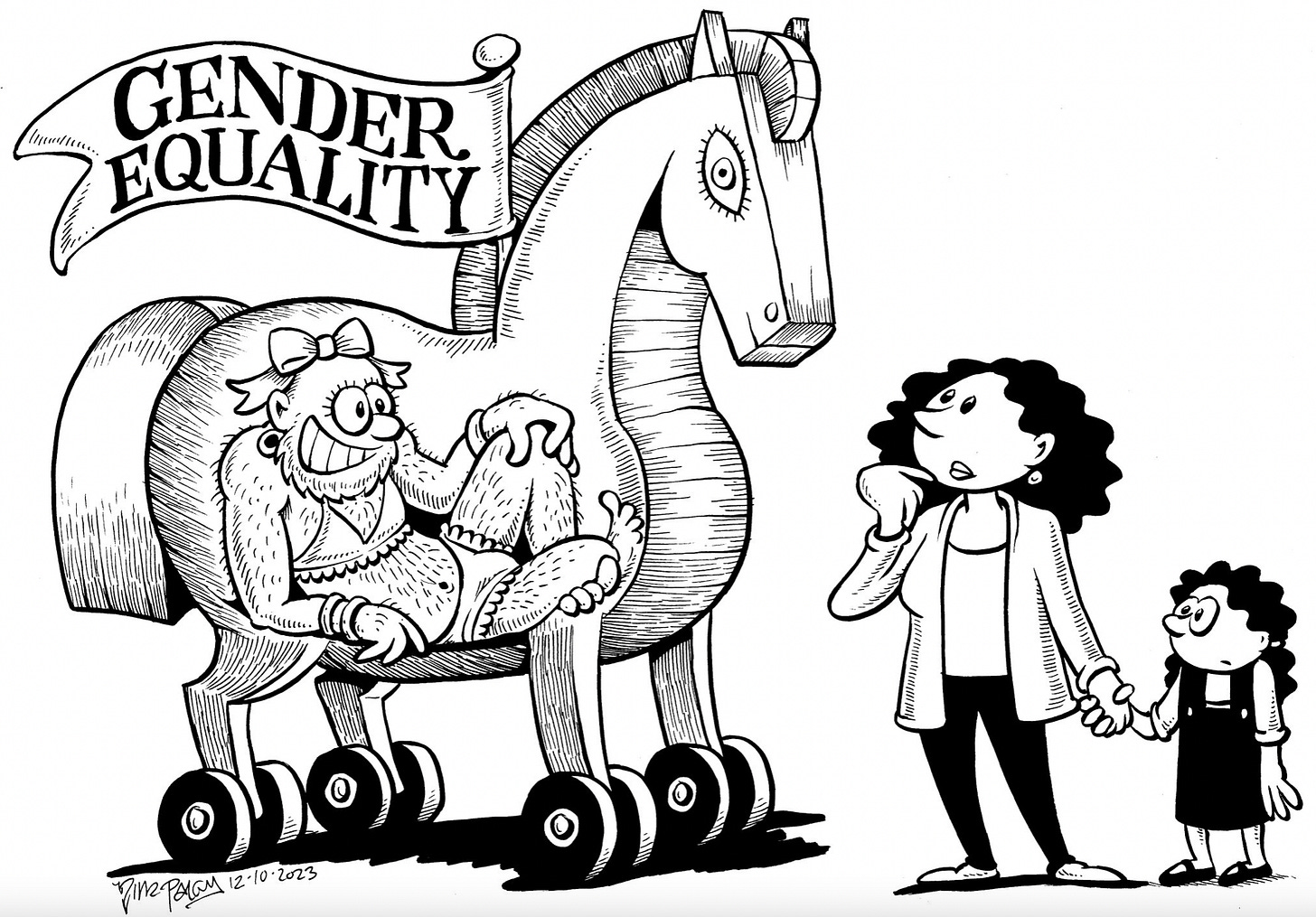The Gender Equality Trojan Horse
The quest for gender equality has transposed into an adoption of gender identity theories resulting in the destruction of women's rights

March 2022, Afghanistan. RTÉ foreign editor, Eimear Lowe, sits in a plush peach velvet wingchair opposite Taliban spokesperson for the Ministry of Foreign Affairs, Abdul Qahar Balkhis and interviews him about the regime. The Taliban has already barred girls from secondary education, and women are required to have a close male relative with them when travelling distances of over eighty kilometres. Lowe is wearing a plum headscarf draped around her hair and a loose-fitting black gown that reaches to her ankles where it meets an incongruous looking pair of sturdy hiking boots. Lowe asks Balkhis if men and women are equal in Afghanistan. Balkhis responds ‘yes, absolutely, God has created both men and women equal’.
The ideal of gender equality means different things to different people. The concept, therefore, requires rigorous interrogation. Both ‘gender’ and ‘equality’, are terms that are open to interpretation and, at the same time, the quest for gender equality has implications for how entire societies operate. Is gender a sex binary of male and female? Or is it a social construct, a spectrum of masculine and feminine characteristics, an identity, a role? What would gender equality look like if achieved? How could gender equality be realised?
In Afghanistan under the Taliban, gender equality involves female seclusion. In the west, gender equality is a trojan horse resulting in the erasure of sex differences and the adoption of gender identity theory in law and policy whereby gender identity is considered more important than biological sex.
The first indication I had that gender equality was a trojan horse was when I came across the Athena SWAN Charter, a framework to support gender equality in higher education. The Charter, launched in the UK in 2005, was designed to support women in disciplines such as science and engineering. The Charter was adopted in Ireland in 2015 but, since then, its focus has shifted from the advancement of the careers of women to the promotion of contested theories about gender identity.
The importance of the Athena SWAN Ireland Charter was reiterated in a 2022 report on gender equality in higher education institutions. The Chair of the expert group that developed the report stated in the preface that ‘the argument for gender equality no longer must be made or defended – it should simply be an accepted feature of a society where there is equality of access and opportunity for all’. However, the closure of debate of any contested topic in higher education spells stagnation, censorship, and the imposition of an ideology on all.
That 2022 report on gender equality also pointed out that a ‘Gender Equality Enhancement Fund’ established in 2020 was used for, amongst other things, ‘gender identity, expression and diversity training for staff in Irish HEIs’. I attended one of these training workshops in 2021. Attendees were advised that puberty blockers are fully reversible, and everyone was encouraged to use pronouns in email signatures.
Further evidence that gender equality is a trojan horse for gender identity can be found in Ireland’s 2021 ‘Report of the Citizens’ Assembly on Gender Equality’. The Assembly, established in 2019 by the Oireachtas (Irish parliament), was charged with the task of making recommendations to the Oireachtas on how to advance gender equality. There are a few telling comments in that report including one sentence written by Chair of the Assembly, Dr. Catherine Day, in which she reflects on the Assembly process:
12.2 Gender Equality – a topic that affects us all
Our gender identity affects many aspects of our lives. From the outset, it seemed to me that the Assembly should treat gender equality as a matter for everyone, regardless of their gender identity.
The public consultation process carried out as part of the Citizens’ Assembly included a consultation document in which it was pointed out that the Oireachtas resolution establishing the Assembly referred to ‘women and men, girls and boys’ and then advised those making submissions that ‘for the purposes of this consultation, please understand ‘gender’ to refer to any and all options in terms of ‘gender identity’’.
The Citizens’ Assembly on Gender Equality therefore used a definition of gender that related to gender identity rather than to the sex binary of male and female. This has enormous implications for Ireland. The Report by the Citizens’ Assembly is now one of the main factors being used to justify two referendums on gender that are due to take place in Ireland on International Women’s Day 2024 (March 8th). The changes recommended by the Citizens’ Assembly will see the erasure of the words ‘woman’, ‘mother’ and ‘home’ from Article 41.2 of the Irish constitution.
The quest for gender equality is a trojan horse that is already resulting in the erasure of women’s rights. It is also impacting on children’s health and wellbeing and has implications for education and for free speech. The shutting down of debate is already evident and those who dare to question the drive are exposed to risks of public shaming. We must continue to question the concept and ideal of gender equality. The gender equality trojan horse should not be taken at face value. We must look inside.
*With huge thanks to all those who contributed to the Go Fund Me Campaign that raised €200 to pay cartoonist Nina Paley for her brilliant cartoon. Please feel free to share the cartoon.




"Gender" has become a weasel word: as the Trojan horse for the cult of "gender identity" ideology. Instead I think we need resolutely to use the term SEX: for sex equality, the sex pay gap, and all the issues where "gender" used to denote sex -- but doesn't any longer.